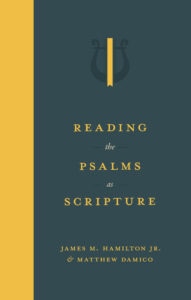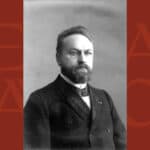
James M. Hamilton Jr. and Matthew Damico are the co-authors of Reading the Psalms as Scripture. They guide the reader to delight in the spiritual artistry of the psalms. Psalms is a carefully arranged book saturated in Scripture. The psalmists drew from imagery and themes from earlier Scripture, which are then developed by later Scripture and fulfilled in Christ.
In our interview below, the two authors reflect on their collaborative effort in writing the book and the joys found in singing the Psalms.
James M. Hamilton Jr. is professor of biblical theology at The Southern Baptist Theological Seminary and senior pastor of Kenwood Baptist Church in Louisville, Kentucky. He is author of two volumes on Psalms in the Evangelical Biblical Theology Commentary and of Typology—Understanding the Bible’s Promise-Shaped Patterns.
Matthew Damico is pastor of worship and operations at Kenwood Baptist Church in Louisville, Kentucky, and director of Kenwood Music.
Lexham Press: Gentlemen, thank you for participating in this interview. Can you tell us the story behind Reading the Psalms as Scripture and describe its basic thesis?
James Hamilton: Having completed my commentary on Psalms, I was invited to speak on Psalms to an event for pastors from the Evangelical Free denomination. Then the pandemic happened, which forced the event online. My fellow pastor, Matt Damico, tuned into the event online and watched my lecture. He then emailed me asking if I had thought about writing a short book on how to read the Psalms. I replied that I hadn’t, but that if he would write it with me, we could go for it. He jumped in, and here we are.
Matthew Damico: This book came about from a desire to help Bible readers know how to read and understand the Psalms. Given how common it is — and understandably so — to read the Psalms as isolated poems, we wanted to equip Christians to see the way the Psalter is more than that. So Reading the Psalms as Scripture’s main claim is that God so inspired the Psalms to be read as a book. That book contains individual psalms, to be sure, but those psalms are arranged and handed down to us so that we might not miss the forest for the trees.
LP: What contribution do you hope to make with your book?
Hamilton: I hope that people will read the Psalms, memorize the Psalms, and meditate on the Psalms, and I hope that our little book will help them understand what they find in the Psalms. I think the biggest takeaway might be the idea that the Psalms should be considered in relationship to one another, as together they form an impressionistic storyline.
Damico: We hope to help recover the notion that the Psalms are, as Luther said, “a little Bible.” It is a book to be read as a book, full of divine truth and splendor.
LP: What was a particularly surprising or enjoyable aspect of writing your book?
Hamilton: Matt and I serve together at Kenwood Baptist Church, and I typically preach, while he leads the music (and a lot of other ministry). When I started a sermon series through the Psalms, I mentioned to Matt that I would love for us to sing more Psalms at Kenwood, and he did a great job accommodating that request. It’s been a joy to “translate” our joint efforts in the face to face ministry at Kenwood into writing as we’ve worked together on this book.
Damico: It was a real joy to pursue the reasons why God commands his people to sing, and why he calls us to sing psalms, specifically. I was renewed in my commitment to sing the psalms, and I pray it will have the same effect on our readers.
LP: Please share with the readers here a surprising fact about yourself that only your friends would know?
Hamilton: I have five kids and at different points have coached them all in various sports ranging from girls softball to elementary cross country to youth basketball, and I’m now the varsity high school baseball coach at Highlands Latin School in Louisville (in addition to teaching at SBTS and pastoring at Kenwood).
Damico: I spent a summer in college working as a kayak tour guide in Alaska.







